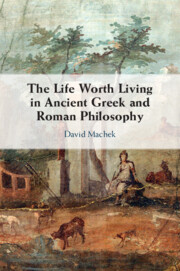Book contents
- The Life Worth Living in Ancient Greek and Roman Philosophy
- The Life Worth Living in Ancient Greek and Roman Philosophy
- Copyright page
- Dedication
- Epigraph
- Contents
- Acknowledgements
- Abbreviations
- Introduction
- Chapter 1 Plato on Making Life Worth Living by Doing One’s Job
- Chapter 2 Aristotle on the Natural Goodness of Life
- Chapter 3 Decoupling Happy Life from Life Worth Living in Stoicism
- Chapter 4 Threshold Nears the Target: Hellenistic Hedonists on the Life Worth Living
- Chapter 5 Peripatetics on Vicious Humans and Caged Animals
- Chapter 6 Plotinus on the Worth of Embodied Existence
- Conclusions
- Bibliography
- Index Locorum
- Subject Index
Chapter 1 - Plato on Making Life Worth Living by Doing One’s Job
Published online by Cambridge University Press: 29 April 2023
- The Life Worth Living in Ancient Greek and Roman Philosophy
- The Life Worth Living in Ancient Greek and Roman Philosophy
- Copyright page
- Dedication
- Epigraph
- Contents
- Acknowledgements
- Abbreviations
- Introduction
- Chapter 1 Plato on Making Life Worth Living by Doing One’s Job
- Chapter 2 Aristotle on the Natural Goodness of Life
- Chapter 3 Decoupling Happy Life from Life Worth Living in Stoicism
- Chapter 4 Threshold Nears the Target: Hellenistic Hedonists on the Life Worth Living
- Chapter 5 Peripatetics on Vicious Humans and Caged Animals
- Chapter 6 Plotinus on the Worth of Embodied Existence
- Conclusions
- Bibliography
- Index Locorum
- Subject Index
Summary
Focusing on the Republic, this chapter argues that Plato regards psychological health, or the virtue of justice, as the necessary – and sufficient – condition of a human life worth living. This healthy condition amounts to a good exercise of soul’s function (ergon), which is premised on a good exercise of an individual’s function, or job, in the city. This account allows even peasants or craftsman in Plato’s ideal city to have a life worth living, even though they fall short of the best possible human life lived by the rulers-philosophers. It is argued that this non-elitist account of a life worth living is compatible with the famous claim from Plato’s Apology that an unexamined life is not worth living for humans. For in the ideal city all citizens live an examined life, at the very least in the sense of being ruled by the wise philosophers. At the same time, Plato decisively denied the possibility that the mere fact of being alive, or the fact of having a soul, would be a good. It can be a good, if a life is lived well, or it can be an evil, if a life is lived badly.
- Type
- Chapter
- Information
- Publisher: Cambridge University PressPrint publication year: 2023

